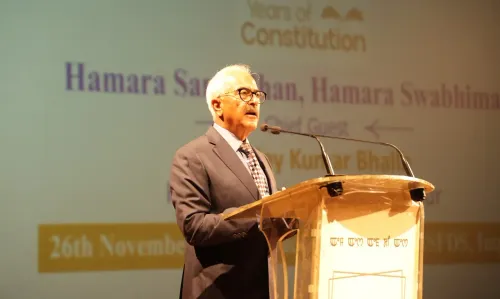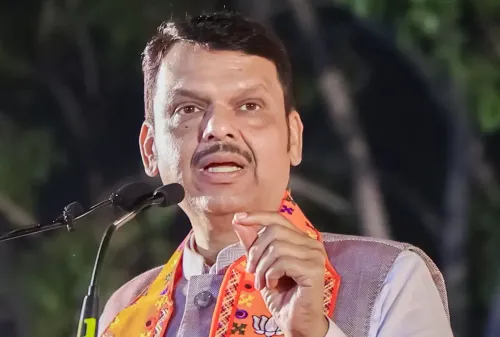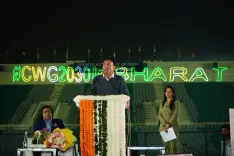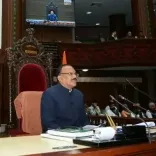Does Pakistan Have Any Moral Authority to Criticize Others?

Synopsis
Key Takeaways
- India firmly rebukes Pakistan for its comments on the Ram Janmabhoomi Temple flag hoisting.
- Pakistan's human rights record is highlighted as a reason for its lack of moral authority.
- International attention is drawn to the historical context of Pakistan's actions.
- Minority rights remain a contentious issue in Pakistan.
- Both nations need to address their human rights challenges.
New Delhi, Nov 26 (NationPress) On Wednesday, India fiercely criticized Pakistan for its comments regarding the flag hoisting at the Ram Janmabhoomi Temple in Ayodhya. The Indian government emphasized that Islamabad lacks any moral authority to lecture others, given its history marked by bigotry, repression, and systemic maltreatment of minorities.
During a weekly media briefing, Ministry of External Affairs (MEA) spokesperson Randhir Jaiswal asserted that Pakistan should concentrate on addressing its own dire human rights record.
When questioned about the statement from Pakistan’s Foreign Ministry concerning the flag hoisting at the Ram Janmabhoomi Temple in Uttar Pradesh, Jaiswal replied, “We have noted the reported comments and dismiss them with the disdain they warrant. With a severely tarnished record of bigotry, repression, and systematic abuse of its minorities, Pakistan has no moral standing to admonish others. Instead of issuing hypocritical sermons, it would be more prudent for Pakistan to introspect and address its own dismal human rights situation.”
India’s response follows a condemnation from Pakistan’s Foreign Office regarding the flag hoisting at the Ayodhya temple, claiming it exemplifies a broader pattern of marginalization faced by religious minorities in India.
Last month, during a session at the United Nations, India launched a vigorous attack on Pakistan's actions, reminding the world of the Islamabad-backed Pahalgam attack, which serves as a stark reminder of Pakistan being the “most egregious violator of human rights.”
“The global community is well aware of Pakistan's support for cross-border terrorism and its weaponization of terrorism as a state policy against India,” stated Raghoo Puri, a First Secretary at India’s UN Mission, on October 22.
“Terrorism represents the gravest threat to humanity, and entities like Pakistan, which facilitate and support it, are the worst violators of human rights,” he added.
“The heinous, targeted attacks executed by Pakistan-trained terrorists, which resulted in the deaths of 26 innocent civilians in Jammu and Kashmir’s Pahalgam on April 22, 2025, have not been forgotten by the world,” he remarked.
Puri was addressing what he described as Pakistan's attempts to “spread falsehoods and create misleading comparisons” during an interactive dialogue with the Special Rapporteur on Fundamental Freedoms While Countering Terrorism at the General Assembly’s Third Committee, which focuses on humanitarian affairs.
India has consistently highlighted Pakistan's recent air strikes on Afghanistan as a blatant breach of UN Charter and international law.
At the UN, India also recalled the genocide perpetrated by Pakistan in Bangladesh during its War of Independence in 1971, asserting that while Pakistan attempts to disguise its actions under the guise of “Islamophobia,” it has institutionalized religious and ethnic persecution as state policy, labeling certain groups as “Khawarij/Fitna,” terms with significant religious implications.
These terms, rooted in Islamic history, refer to dissident religious factions that faced defeat, and Pakistan has applied this terminology to some of its opposition groups. The Indian diplomat at the UN Mission stated that Pakistan has “normalized the dehumanization of its ethnic and religious minorities.”
For decades, Islamabad has systematically persecuted Hindu, Christian, and Ahmadiyya minority communities with impunity in the name of religion, and this practice continues unabated.









